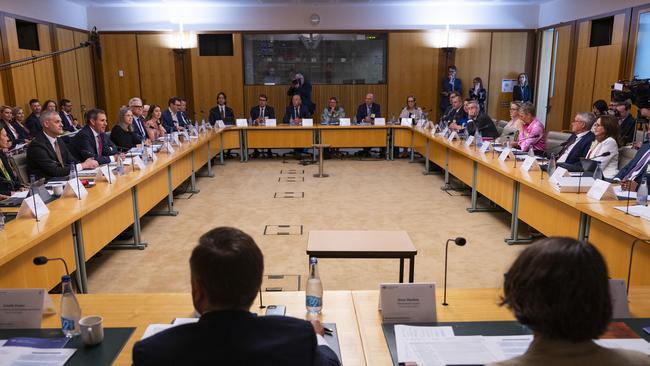Australian investor heavyweights call for policy clarity to boost private investment in energy
Australia’s top financiers called for policy clarity and more measures to bolster private investment in the country’s energy transition at the Albanese government’s third investor roundtable.

The chief executives of Australia’s major banks, superannuation funds and private equity firms called on the Albanese government for policy clarity and more measures to bolster private investment in the country’s energy transition.
Addressing an investor roundtable convened by Treasurer Jim Chalmers on Tuesday, NAB chief executive Ross McEwan said the bank would welcome “fast progress” on key government initiatives.
“We see the Government’s development of sectoral decarbonisation plans and pathways as key enablers for transition, and would welcome fast progress on this front,” he said.
“The ability to work together with Government is critical to Australia’s success in managing the transition. It has been tough for businesses and sectors to make decarbonisation decisions and investments without this whole-of-economy clarity.”
A massive $625bn investment is required to decarbonise Australia’s industry and energy system by 2050, according to think tank Climateworks. This includes $400bn for business as usual activities and $225 billion to transform the energy system.
“The challenge we face is not a lack of capital, but a shortage of good quality investment opportunities,” AustralianSuper chief executive Paul Schroder said.
“Collaboration across all sectors of the economy, underpinned by policy certainty, will deliver the outcomes we need to respond to this challenge and deliver better outcomes for all.”
The roundtable comes as a blueprint paper published by the largest industry super funds last week that called for speedy planning processes for new energy transmission lines and other key policy measures to accelerate the energy transition, which the funds estimate will cost some $12bn a year between now and 2050.
After the meeting, which brought together representatives from some of Australia’s biggest investors and financiers with about $2.5tn in capital, the government announced a number of policies it said would help with the investment challenge.
Those included making the recently-established Net Zero Economy Authority responsible for co-ordinating opportunities to boost private capital investment, more funding for the ongoing efforts to develop sustainable finance standards, and a pledge to review the super performance test so that it doesn’t hinder investment in the country’s net-zero transformation.
Funds had raised concerns that the test – introduced by the Coalition government to cover MySuper products in 2021, and expanded by the current government to also include choice products – can discourage investments in green, housing or other asset classes that could strengthen the economy, for fear of failing the YFYS assessment.
A consultation paper with potential solutions to address those issues will be released soon, it said.
Industry participants had also agreed on principles to guide its six sector decarbonisation plans, including a requirement for them to be “credible, clear and comprehensive, promote stability, be outcome oriented and drive practical action,” according to a statement released after the meeting.
The principles also included for the net-zero pathways to “be co-ordinated and integrated and be dynamic,” the statement, issued by the Treasurer alongside climate change and energy minister Chris Bowen, and defence industry minister Pat Conroy, said.
Mr McEwan from NAB also said having more clarity about “where the Government lands on actions needed to reduce emissions in each sector would assist greatly” in making investment and decarbonisation decisions.
“So too will consistent corporate disclosure requirements and a uniform approach to company transition plan development,” he told the meeting. “These would ensure transparency and reduce complexity, against the risk of banks and government having similar but varied requirements on industry. It can strengthen investor confidence to guide where financial institutions could best allocate financing to help meet the net zero target.”
At the meeting the government pledged to evaluate options for partnering with private investors in an investment fund to allocate capital in small and medium enterprises (SMEs) developing the defence capabilities that Australia needs.
“We need more private capital in the net zero transformation, defence industry and social impact and we’ve made some great progress today by working collaboratively with the investment community,” Mr Chalmers said.
“Investing in our national priorities can present big opportunities for investors and big opportunities for Australians, their communities and their economy,” he said.
“This is all about working together to modernise our economy and maximise our opportunities in the defining decade.”
The government would also seek to reform procurement processes to make it easier for small and medium businesses to do business with defence, and consider opportunities to invite private firms to invest in defence infrastructure technologies.
Mr Chalmers started convening the meetings in 2022, with a focus on affordable housing. At the second round table, held in April, the government announced plans for a green government bond, consistent clean energy standards and home ratings and further funding for the corporate regulator to assist a crackdown on greenwashing claims by companies.
On Tuesday, the government also unveiled the framework for its sovereign green bond, and said it would invest an additional $550,000 to partner with the Australian Institute of Sustainable Finance to develop that taxonomy.
Cath Bowtell, chair of IFM Investors, a key infrastructure investor on behalf of major industry super funds, said “this kind of collaboration has the potential to be a win-win for the retirement savings of millions of working people, and the future energy needs of Australia.”
“We will continue working closely with the government and the Net Zero Economy Authority to help drive greater investment that can deliver long-term returns.”
Investors and financiers at the meeting will form four ongoing working groups to address barriers to investment in housing, the net zero transformation, defence and social impact investment, the government said.
Westpac, Macquarie, the Minderoo Foundation and the Paul Ramsay Foundation agreed “in-principle” to invest alongside the government in social impact initiatives that deliver outcomes for communities and tackle disadvantage.
They will also contribute to the co-design and help identify opportunities for the government’s $100m Outcomes Fund once it is established.




To join the conversation, please log in. Don't have an account? Register
Join the conversation, you are commenting as Logout